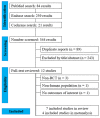Effects of Caffeine on Main Symptoms in Children with ADHD: A Systematic Review and Meta-Analysis of Randomized Trials
- PMID: 37759905
- PMCID: PMC10526204
- DOI: 10.3390/brainsci13091304
Effects of Caffeine on Main Symptoms in Children with ADHD: A Systematic Review and Meta-Analysis of Randomized Trials
Abstract
(1) Background: Attention-deficit/hyperactivity disorder (ADHD) is typically treated with stimulant medications, which may lead to several adverse effects. Recent animal studies have shown that caffeine can improve the symptoms of ADHD. This systematic review and meta-analysis sought to evaluate the effect of caffeine on ADHD symptoms in children. (2) Methods: PubMed, Embase, and Cochrane databases were searched for randomized controlled trials comparing caffeine with placebo in children, comparing overall symptoms of ADHD, inattention, hyperactivity, and impulsivity. (3) Results: We included seven RCTs in the systematic review for qualitative assessment, with 104 patients aged 5 to 15 years. Four of these studies (n = 76) were included in the meta-analysis. After qualitative analysis, four studies indicated no improvement in any of the ADHD symptoms compared with placebo. One study showed improvement in ADHD symptoms based on 1 of 5 scales applied. One study indicated significant improvement in general symptoms, inattention, and hyperactivity. One study indicated improvement in sustained attention but a worsening of impulsivity. In contrast, when using a quantitative analysis of the general symptoms of ADHD, the data showed no significant difference when comparing placebo with caffeine (standardized mean difference -0.12; 95% CI -0.44 to 0.20; p = 0.45; I2 = 0%). (4) Conclusion: overall, the totality of the evidence suggests no significant benefit of caffeine over placebo in the treatment of children with ADHD.
Keywords: ADHD; attention deficit hyperactivity disorder; caffeine; children; neurodevelopmental disorders; pediatric.
Conflict of interest statement
The authors declare no conflict of interest.
Figures
Similar articles
-
The Effects of Long-Acting Stimulant and Nonstimulant Medications in Children and Adolescents with Attention-Deficit/Hyperactivity Disorder: A Meta-Analysis of Randomized Controlled Trials.J Child Adolesc Psychopharmacol. 2018 Oct;28(8):494-507. doi: 10.1089/cap.2017.0151. Epub 2018 Jun 13. J Child Adolesc Psychopharmacol. 2018. PMID: 29897263 Review.
-
Immediate-release methylphenidate for attention deficit hyperactivity disorder (ADHD) in adults.Cochrane Database Syst Rev. 2021 Jan 18;1(1):CD013011. doi: 10.1002/14651858.CD013011.pub2. Cochrane Database Syst Rev. 2021. PMID: 33460048 Free PMC article.
-
A Phase III, Randomized, Double-Blind, Placebo-Controlled Trial Assessing the Efficacy and Safety of Viloxazine Extended-Release Capsules in Adults with Attention-Deficit/Hyperactivity Disorder.CNS Drugs. 2022 Aug;36(8):897-915. doi: 10.1007/s40263-022-00938-w. Epub 2022 Jul 27. CNS Drugs. 2022. PMID: 35896943 Free PMC article. Clinical Trial.
-
Practitioner Review: Pharmacological treatment of attention-deficit/hyperactivity disorder symptoms in children and youth with autism spectrum disorder: a systematic review and meta-analysis.J Child Psychol Psychiatry. 2021 Jun;62(6):680-700. doi: 10.1111/jcpp.13305. Epub 2020 Aug 26. J Child Psychol Psychiatry. 2021. PMID: 32845025
-
Amphetamines for attention deficit hyperactivity disorder (ADHD) in adults.Cochrane Database Syst Rev. 2018 Aug 9;8(8):CD007813. doi: 10.1002/14651858.CD007813.pub3. Cochrane Database Syst Rev. 2018. PMID: 30091808 Free PMC article.
References
-
- GBD 2019 Mental Disorders Collaborators Global, Regional, and National Burden of 12 Mental Disorders in 204 Countries and Territories, 1990–2019: A Systematic Analysis for the Global Burden of Disease Study 2019. Lancet Psychiatry. 2022;9:137–150. doi: 10.1016/S2215-0366(21)00395-3. - DOI - PMC - PubMed
-
- Felt B.T., Biermann B. Diagnosis and Management of ADHD in Children. Am. Fam. Physician. 2014;90:456–474. - PubMed
Publication types
LinkOut - more resources
Full Text Sources



